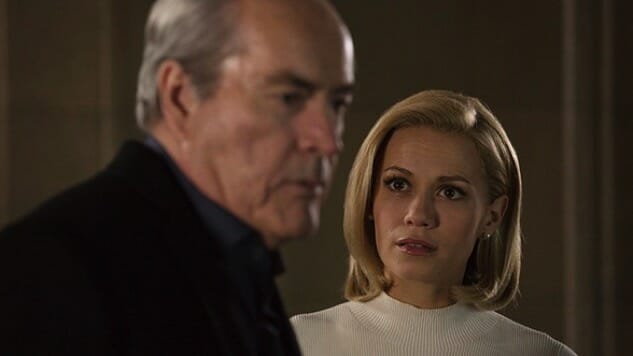Marvel’s Agents of S.H.I.E.L.D.: “Paradise Lost”
(Episode 3.16)

Seriously you guys, maveth. If you thought it was going away after midseason then you clearly haven’t been paying attention. Punishment is reaching out to touch everyone tonight, and while May’s deadpan is always appreciated, there’s no amount of “hard enough” killing that would have stopped the Anti-Ward.
It seems instead that with a little bit of science help from Simmons, Coulson realizes just what kind of consequences killing Ward has brought down. Simmons tells us that Anti-Ward’s powers spring from the use of tiny organisms that eat living flesh, but can also reanimate living flesh with… well…complicated consequences, not the least of which is freaking ZOMBIES! Seriously, Ward is the biological definition of a zombie virus: reanimating or eating living tissue as it sees fit. So obviously Marvel had to go and ask: what could make a zombie scarier? I’m sure they pondered for a while, and then one night while watching a rerun of Jaws 4: The Revenge, a writing assistant—let’s call her Suzan—had the eureka moment to beat all eureka moments. Suzan realized that having an unstoppable killing machine come after you is about a million times more frightening if that killing machine is doing so because it’s holding a grudge. And this zombie will have to be different because this zombie will need memories if it’s going to remember why it wants to kill someone. And just like that Suzan figures out the mathematical formula for a sentient zombie. A sentient zombie that couldn’t have existed without Coulson killing its current host and, in a lot of ways, adding more personal fuel to its revenge fire. Ward coming back to haunt you indeed, Coulson.
The bigger surprise tonight, is that while punishment for violence touches everyone a little bit (Coulson’s obvious penalty for Ward, May’s hubris in dealing with Giyera, Lincoln’s drunk driving), we spend most of the episode tagging along with Hydra. It’s a difficult task: creating sympathy for a character you spend so much time building up as a villain, but that’s exactly what Agents is aiming at when they decide to dedicate this episode to Gideon Malick’s rise to power.
-

-

-

-

-

-

-

-

-

-

-

-

-

-

-

-

-

-

-

-

-

-

-

-

-

-

-

-

-

-

-

-

-

-

-

-

-

-

-

-








































